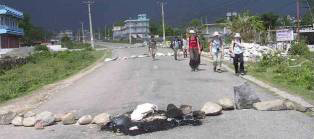Global travel carries some risk for researchers
May - June, 2008 | Volume 7, Issue 3
Although Indiana Jones is one of a kind, globe-trotting science carries some risk for the non-archaeologist as well.
Dr. Jim Herrington, Fogarty's director of international relations, was a CDC envoy to the Ivory Coast in 1990 when he drove to the airport to pick up a colleague and noted "an airport that wasn't bustling!" The sudden appearance of camouflaged soldiers jumping from behind bushes and firing machine guns into the air signified he would not be picking up his friend; the airport had been closed by the army's foot soldiers demanding better living conditions from the government.

A makeshift roadblock in Pokhara, Nepal in 2004, site of
Maoist rebel activity.
The ensuing turmoil and natural death of President Houphouet-Boigny led to economic collapse - and the end of the most successful immunization campaign in sub-Saharan Africa, with a vaccination rate that fell precipitously shortly thereafter due to civil war.
Dr. Joconiah Chirenda, a Fogarty Frameworks grantee at the University of Zimbabwe, says the worst part of the continuing political strife in this country has not been physical danger but inadequate resources that result in high faculty-student ratios.
Dr. Nalini Sathiakumar, a pediatric epidemiologist at the University of Alabama who is a Fogarty grantee doing work in South Asia, says, "I have certainly had a sense of fear" in her research travels. "Like many parts of the developing world, South Asia's political climate seems to be in constant motion, and the situation can change from tranquil to precarious without much notice," she says.
A U.S. citizen, Dr. Sathiakumar is a native of India who was working in Pakistan when the USS Cole was bombed, and "the atmosphere was very apprehensive in Karachi." A year later, she was scheduled to be in Pakistan to run a training program, but the events of Sept. 11 made it necessary to move the program to Nepal, Sri Lanka and India.
While conducting a workshop in Pokhara, Nepal, fighting broke out between Maoists rebels and government forces within a five-mile radius of her team's hotel and training site. Curfews and roadblocks were instituted and the airport was closed, but by the time the workshop ended, so did the outbreak of violence.
In Sri Lanka, says Sathiakumar, most of the violence is aimed at civilians in public places. "However, our Sri Lankan partners have been extremely cautious by arranging private transport for trainers and workshop participants, choosing hotels and restaurants based on the current political situation," she says.
To view Adobe PDF files,
download current, free accessible plug-ins from Adobe's website.